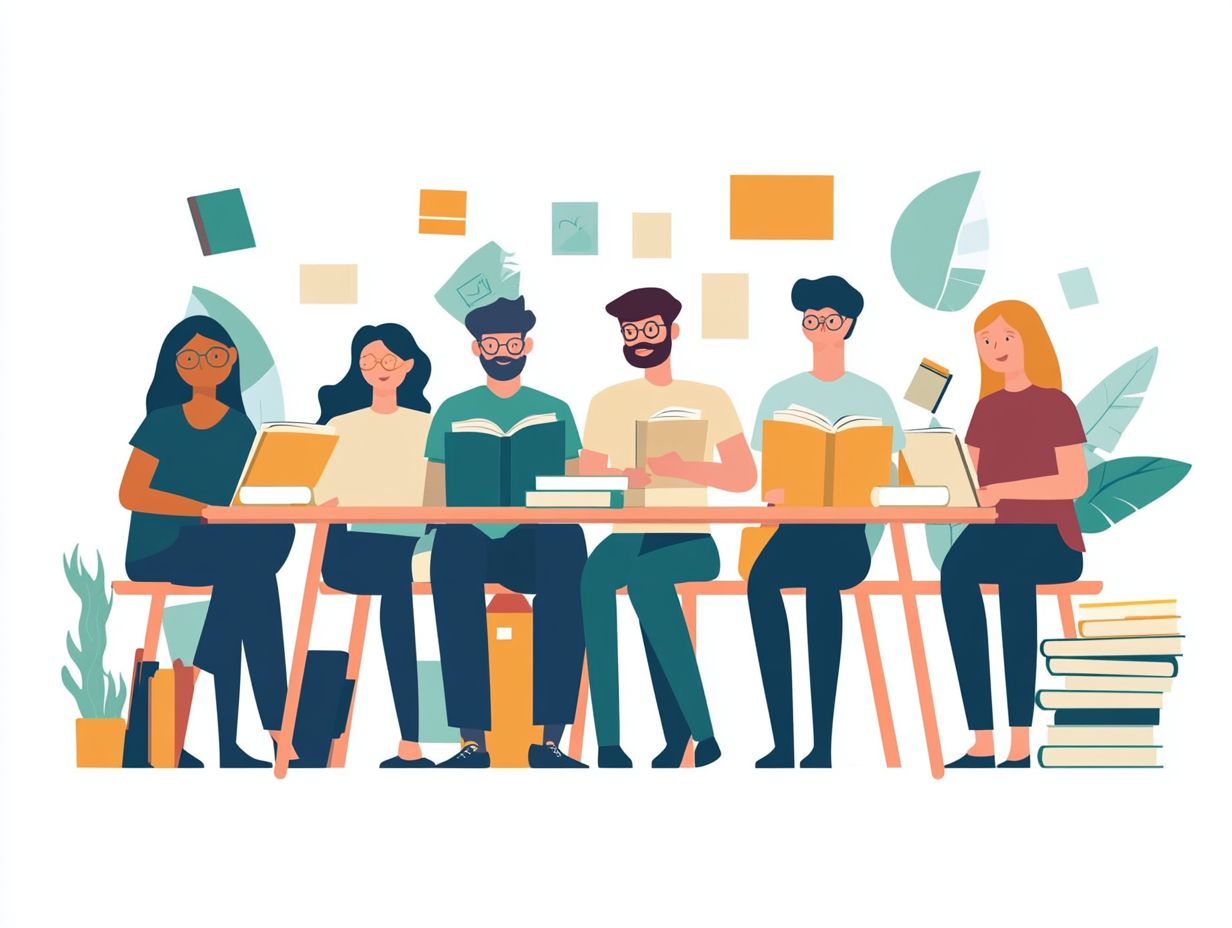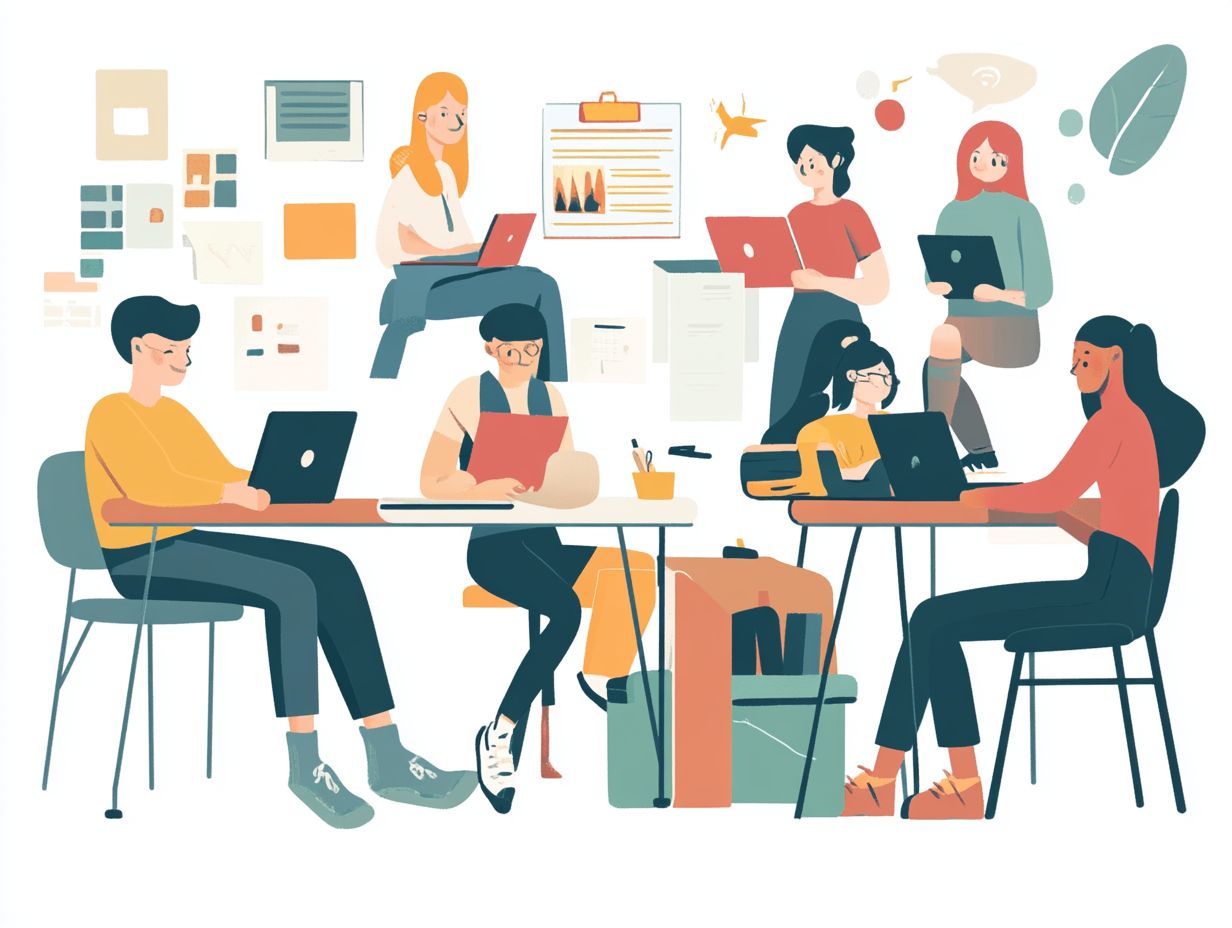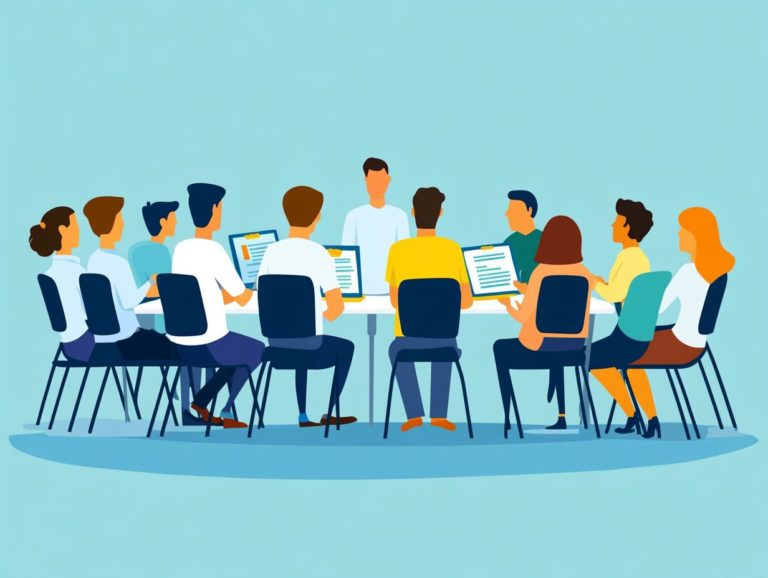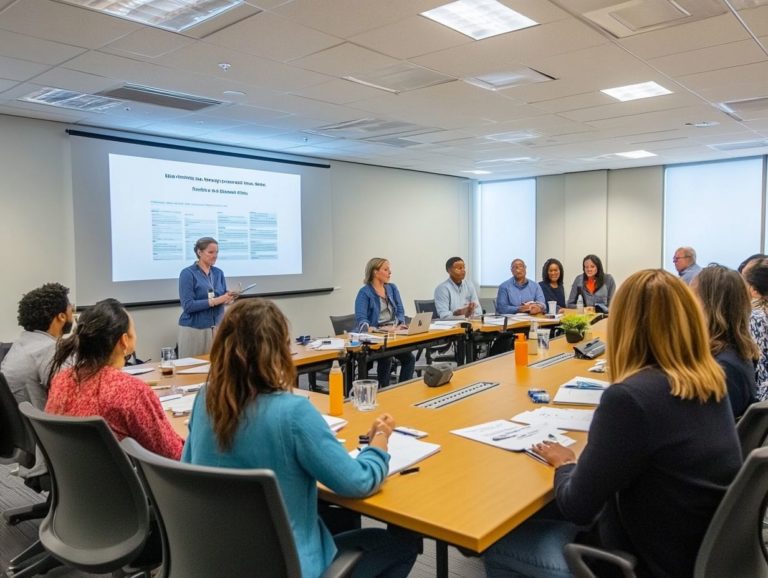What Is the Importance of Continuous Learning?
In today’s fast-paced world, the importance of continuous learning has reached unprecedented levels. As technology advances and industries shift, your ability to adapt and grow is essential for achieving personal and professional success.
This article delves into the essence of continuous learning, highlighting the benefits it brings and offering practical ways for you to weave it into your daily life. You’ll also discover common challenges you may encounter along the way and effective strategies to navigate them.
Embrace the journey of lifelong learning, and unlock your full potential!
Contents
- Key Takeaways:
- The Concept of Continuous Learning
- Benefits of Continuous Learning
- Ways to Continuously Learn
- Challenges of Continuous Learning
- Implementing Continuous Learning in Your Life
- Frequently Asked Questions
- What is the importance of continuous learning?
- How does continuous learning benefit an individual?
- What are the benefits of continuous learning for organizations?
- Can continuous learning improve job performance?
- What role does continuous learning play in personal growth?
- How can one incorporate continuous learning into their daily routine?
Key Takeaways:

- Continuous learning constantly enhances your skills and knowledge.
- It helps you stay relevant in a rapidly changing world.
- Ways to learn include formal education, self-study, and mentorship.
The Concept of Continuous Learning
Continuous learning is not just a concept; it s an essential philosophy in today s ever-evolving job landscape. You need to embrace a growth mindset to truly thrive amidst shifting technologies and diverse employer expectations.
This approach embodies the ongoing journey of acquiring new skills, knowledge, and competencies throughout your career, ultimately nurturing both your personal and professional development.
Defining Continuous Learning
Continuous learning embodies the dedication to improving your skills, often leveraging a variety of resources, including mobile learning and online platforms you can access on your phone.
Embracing this journey is crucial for your success! It equips you to navigate the ever-evolving landscape of industries, technologies, and job expectations. By embracing continuous learning, you position yourself to remain competitive and relevant, enhancing both your career prospects and job satisfaction.
A wealth of resources awaits you in this learning endeavor, from online courses and webinars to workshops and informal knowledge-sharing opportunities. These resources cater to a diverse array of learning styles be it visual, auditory, or kinesthetic ensuring that you can discover an approach that truly resonates with you.
You also contribute to a more engaged and informed workforce.
Benefits of Continuous Learning
The advantages of continuous learning reach far beyond merely enhancing individual skills; they play a crucial role in elevating organizational performance, boosting employee retention, and fostering overall job satisfaction across varied professional landscapes.
Embracing lifelong learning not only empowers you but also contributes to a thriving workplace culture where everyone can excel.
Personal and Professional Growth
Continuous learning is your gateway to both personal and professional growth, providing valuable upskilling opportunities that can significantly enhance your career success and satisfaction.
In today s ever-evolving job market, adapting to new technologies and methodologies is essential. For example, pursuing certifications in data analysis or project management can unlock advanced positions, making you more competitive in the field. Employers are increasingly on the lookout for candidates with specialized skills, whether in digital marketing or software development, to keep pace with the demands of a fast-moving economy.
When you engage in continuous education through workshops, online courses, or industry conferences, you deepen your expertise. This also helps you expand your professional network. Engaging in these activities can lead to collaborative opportunities and mentorship that might just be the key to your next big break.
Embracing this commitment to growth often results in increased confidence, improved job performance, and, ultimately, the career advancement you desire.
Start your learning journey today and watch your career soar!
Adaptability and Resilience

In today s world of rapid technological advancements and an expanding skills gap, continuous learning is essential for cultivating adaptability and resilience. These traits are crucial for navigating the ever-changing job market.
This ongoing pursuit of knowledge enables you to embrace change and pivot in response to evolving demands. For instance, in industries like tech and healthcare, staying updated on developments such as artificial intelligence and telemedicine is imperative.
Companies that invest in learning initiatives create a culture of innovation and enhance their workforce s capacity to tackle unforeseen challenges. By empowering employees to learn new skills and update old skills, organizations position themselves to swiftly navigate market shifts, ensuring long-term sustainability and competitiveness.
Ultimately, your commitment to lifelong learning becomes a cornerstone of both personal and professional growth.
Ways to Continuously Learn
Continuous learning manifests in diverse ways, including formal education, self-directed exploration, and valuable mentorship experiences.
Engaging in networking opportunities within professional communities enhances your growth and development. This allows you to cultivate valuable connections and gain insightful knowledge.
Formal Education
Formal education, typically delivered through respected schools, plays a pivotal role in your continuous learning journey. It presents you with structured programs and professional certifications designed to elevate your specialized skills.
By engaging in various courses ranging from online workshops to advanced degrees you can refine your expertise and adapt to the evolving demands of the workplace. These educational paths, including boot camps and industry-specific certifications, equip you with the latest tools and methodologies relevant to your field.
Staying abreast of emerging trends and technologies is essential for you as a professional. This commitment fuels your career growth and significantly enhances your organization s competitive edge in the market.
Self-Directed Learning
Self-directed learning, enhanced by online resources and mobile learning platforms, gives you the power to take control of your educational journey. This approach offers the flexibility to select topics that resonate with your interests.
Whether you prefer engaging video tutorials, interactive courses, or comprehensive e-books, many online platforms accommodate various learning styles. With mobile applications at your fingertips, you can learn on the go whether during your commute or on a lunch break.
By fostering your independence, self-directed learning boosts your confidence and cultivates critical thinking skills, essential for navigating an ever-evolving world.
Networking and Mentoring
Networking and mentoring are essential for your continuous learning journey. Engaging in professional communities and cultivating mentorship relationships opens the door to invaluable insights and enriching learning opportunities.
These interactions promote your personal growth and nurture a culture of collaboration and knowledge sharing within your organization. Connecting with seasoned professionals in your field taps into a reservoir of expertise and practical advice that can enhance your skill set.
Mentoring relationships inspire you to explore new areas or pursue additional training, paving the way for career advancement. As you engage more with your peers and mentors, you’ll likely experience higher levels of job satisfaction and commitment.
This not only benefits you but also contributes to a more motivated and cohesive workplace overall.
Challenges of Continuous Learning

Despite the many advantages of continuous learning, you’ll face challenges that can impede your journey. Time management, costs, and resource availability often stand in the way, making it difficult to fully engage in better learning opportunities.
Time Management
Effective time management presents a critical challenge in your continuous learning journey. You’ll need to balance your work habits with your commitment to ongoing education and skill enhancement.
Finding this equilibrium not only enhances your personal competency but also significantly boosts overall employee engagement and productivity within your organization. To master this balance, adopting specific strategies can be incredibly beneficial.
Utilizing digital tools like Trello or Asana helps you track your progress on learning goals while keeping your daily tasks organized. Establishing a clear schedule that allocates dedicated time blocks for learning will help you reduce distractions and sharpen your focus.
Incorporating techniques like the Pomodoro Technique (a method of working in short bursts with breaks in between) can further promote effective time management practices. By implementing these tools and strategies, you can successfully navigate your continuous learning journey without compromising your work responsibilities.
Costs and Resources
The costs associated with training programs and available resources can present significant challenges to your continuous learning journey, often discouraging you from pursuing valuable opportunities for growth. This financial burden can feel daunting, especially if you’re working with a tight budget or if your organization is facing limited resources.
However, many cost-effective options exist that won’t break the bank. Online courses, community workshops, and peer-led training sessions often provide enriching experiences at a fraction of the cost. On the organizational side, making strategic investments in employee development can yield substantial long-term returns; well-trained staff tend to be more productive and engaged.
By prioritizing resources wisely and cultivating a supportive environment, you can effectively navigate these financial challenges, paving the way for ongoing growth and skill enhancement.
Implementing Continuous Learning in Your Life
Implementing continuous learning in your life begins with setting clear goals that define your aspirations. Craft actionable plans that serve as your roadmap, and seek out motivation and accountability to support you on this enriching journey of learning and professional growth.
Setting Goals and Creating a Plan
Setting specific goals and crafting a structured plan are crucial for effectively embracing continuous learning. This approach allows you to hone in on your personal development and monitor your performance feedback.
By outlining clear objectives, you can prioritize your efforts and allocate your time wisely, ensuring that your progress is not only measurable but also in harmony with your aspirations. Consider breaking down broad ambitions into smaller, achievable milestones; this method can significantly enhance your motivation and clarity.
Using performance feedback as a tool lets you evaluate your learning journey and adjust as needed along the way. This iterative process helps refine your goals and cultivates a growth mindset, where setbacks are viewed as valuable opportunities for improvement. Regular check-ins and self-assessments serve to effectively align your learning efforts with the ever-evolving personal and professional landscapes you navigate.
Finding Motivation and Accountability

Finding motivation and accountability are essential for your continuous learning journey. They keep you dedicated to your learning goals and professional growth.
Create structured plans that include regular check-ins and milestones. This framework promotes discipline and helps you track your progress.
Engaging with peers builds a sense of community. You’ll find valuable opportunities for solving problems together and sharing experiences.
Guidance from mentors enriches your journey. Their insights can help you navigate challenges and sharpen your focus.
Joining professional communities enhances your experience. You can network, share resources, and gain inspiration, making learning dynamic and enjoyable as you exchange ideas and celebrate achievements together.
Frequently Asked Questions
What is the importance of continuous learning?
Continuous learning is vital for personal and professional growth. It helps you gain new skills and knowledge, so you can adapt to changes and stay relevant in your career.
How does continuous learning benefit an individual?
It improves your critical thinking and problem-solving skills. This makes you more adaptable and resilient when faced with challenges.
What are the benefits of continuous learning for organizations?
For organizations, continuous learning builds a knowledgeable workforce. This leads to increased productivity, creativity, and innovation.
Can continuous learning improve job performance?
Yes! It equips you with new skills and knowledge that you can apply at work. Staying updated with industry trends also makes you a more valuable employee.
What role does continuous learning play in personal growth?
Continuous learning challenges you and broadens your perspective. It helps you discover new interests, leading to a more fulfilling life.
How can one incorporate continuous learning into their daily routine?
Set aside time to read, attend workshops, or take online courses. Stay open to learning from different experiences and sources.






